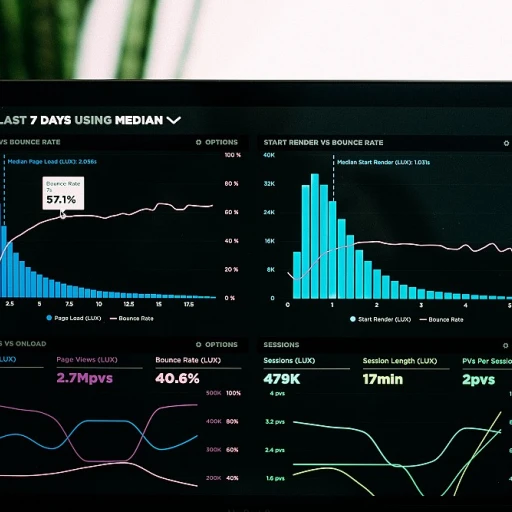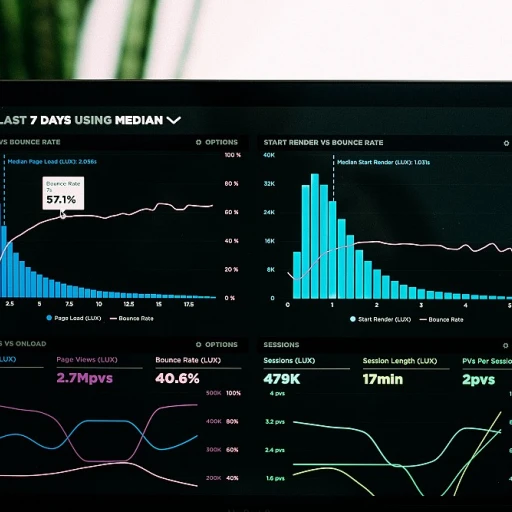Understanding AI's Role in SEO
AI Transforming Search Engine Optimization
Artificial intelligence (AI) is revolutionizing the landscape of search engine optimization (SEO) by facilitating precise and actionable insights into various aspects of digital marketing. From data collection to ads optimization, AI plays an instrumental role in refining the quality and accuracy of online content. By leveraging sophisticated AI tools, advertisers and brands can now enhance the effectiveness of their marketing strategies in real time. The capability of AI to process vast amounts of data ensures that advertisers can maintain data accuracy while crafting compelling ad campaigns. With tools designed for data validation, marketers can ensure data accuracy, aligning their SEO efforts with high-quality content and brand suitability. Moreover, AI offers advanced techniques for audience targeting and brand performance analysis. It empowers advertisers to deliver ads that resonate with their audience, ultimately improving conversion rates and campaign effectiveness. Utilizing AI to refine strategies and enhance content marketing efforts has emerged as an industry best practice. Social media plays a critical role in digital marketing, and AI contributes significantly to this domain by fact-checking and validating content. This ensures that the brand message retains its integrity and appeals to the intended audience. For insights on crafting engaging tweets, explore this resource. AI's integration into SEO offers a pathway to achieving unparalleled precision in content accuracy. Its data-driven approach aids in generating high-quality digital materials, thus supporting a robust and effective marketing strategy. Through continuous innovation and learning, AI remains a cornerstone in the pursuit of superior SEO performance.The Importance of Accurate Ad Content
Why Accurate Ad Content Matters
In the realm of digital marketing, the importance of accurate ad content cannot be overstated. Advertisers and brands rely heavily on the precision of their messaging to connect effectively with their target audience. Ensuring accuracy in content is not just about avoiding errors; it's about building trust and credibility. When ads are accurate, they resonate more with the audience, leading to better engagement and higher conversion rates.
Ensuring Content Quality and Brand Suitability
High-quality content is the cornerstone of successful marketing campaigns. To ensure this, advertisers must adopt best practices in content creation and validation. This involves rigorous fact-checking and using reliable data sources to support claims made in ads. Additionally, ensuring that the content aligns with the brand's values and image is crucial for maintaining brand suitability and reputation.
Leveraging Data for Precision
Data plays a pivotal role in achieving accuracy in ad content. Through effective data collection and data validation processes, advertisers can ensure that the information used in their campaigns is both accurate and relevant. By implementing robust data governance strategies, brands can maintain high data quality, which is essential for crafting compelling and trustworthy ads.
Real-Time Performance Monitoring
To ensure ongoing accuracy and effectiveness, real-time monitoring of ad performance is essential. This involves using advanced tools to track how ads are performing across various platforms, including social media. By analyzing this data, advertisers can make informed decisions to optimize their campaigns, ensuring that they continue to meet their objectives.
For a deeper dive into how AI can enhance lead generation and improve SEO strategies, explore this comprehensive guide.
AI Techniques for Enhancing Ad Content
AI Techniques for Refining Ad Content
The digital marketing landscape is rapidly evolving, and the integration of AI in search engine optimization plays a pivotal role in refining ad content. Understanding how AI can enhance content accuracy and quality empowers advertisers to reach the right audience with precise messaging.
AI employs several techniques to ensure ad content resonates with its target audience and aligns with the brand's voice. Through advanced data collection methods, AI systems analyze vast data sources, social media interactions, and previous campaign performances. This process is crucial for generating high-quality, accurate ads tailored to audience preferences.
One of the key benefits of using AI in this context is real-time data accuracy. AI tools ensure data validation and data governance processes, which ultimately help advertisers maintain content accuracy and brand suitability. By leveraging these tools, advertisers can conduct thorough fact-checking, ensuring the information shared is both relevant and accurate.
Another technique involves utilizing AI-powered content marketing tools to conduct deep audience analytics. These tools gather insights from digital footprints, helping brands create content that resonates on a personal level. This approach not only enhances the precision of marketing strategies but also improves ad performance by closely aligning with audience expectations.
To ensure the best practices are followed, it's vital for advertisers to regularly audit the sources of their data. High data quality is pivotal for achieving desired outcomes in digital campaigns. Through consistent data accuracy checks, brands can enhance their marketing efforts, ultimately leading to successful ad campaigns.
In summary, AI is transforming how advertisers approach content generation by providing robust analytics and insights to refine their messaging. By ensuring accuracy and alignment with brand goals, advertisers can achieve impressive results in their digital marketing endeavors. This requires a commitment to constant data validation and quality control to maintain competitive edge.
Challenges in AI-Driven SEO
Overcoming Common Pitfalls in AI-Enhanced SEO
In the realm of AI-driven SEO, ensuring accuracy in digital marketing campaigns is paramount. Content quality and data validation remain critical factors advertisers must navigate. However, this journey is not without challenges. One major hurdle is maintaining data accuracy. With AI tools collecting vast amounts of information, ensuring data validation is a continuous task. Real-time data sources can sometimes lead to inaccuracies, impacting the brand’s content marketing initiatives. Another challenge is the pressure to produce high-quality ad content that resonates with the audience while ensuring brand suitability. AI can help, yet advertisers must ensure the AI's algorithms align with the desired brand message and tone. Data governance is vital. Advertisers need to set strict guidelines and best practices, not only for data collection but also for data processing, ensuring reliable data quality throughout their campaign strategy. AI techniques also come with the risk of outdated content. Ads need timely updates to meet the audience's evolving needs. Therefore, content accuracy and fact checking should be prioritized to enhance performance. Lastly, ensuring valid data sources is crucial. Incorrect data can lead to inefficient campaigns and reduced audience trust. Continually refining these aspects will help marketers achieve their campaign goals more effectively.Case Studies: Success Stories
Real-World Impact: Success Illustrates Potential
To appreciate the impact of AI-driven SEO on ad content, one needs to look no further than the tangible success stories that have emerged in recent years. Companies that have integrated AI into their digital marketing strategies have reported significant improvements in the precision and performance of their ad campaigns. This section highlights how brands have leveraged AI to enhance content accuracy, ensure brand suitability, and engage their target audiences more effectively.
The integration of AI tools in campaign strategies has enabled advertisers to harness data accuracy and quality, ensuring that their ad content resonates with their intended consumers. Through meticulous data collection and validation processes, companies have been able to target ads with unprecedented accuracy. AI’s ability to process vast amounts of data in real time allows marketers to adapt campaigns almost instantaneously, optimizing performance and ensuring data governance.
Enhanced Brand Suitability and Audience Engagement
Several brands have found success by using AI-driven insights to tailor their content to suit specific audience segments. This targeted approach has not only improved ad content quality but also increased engagement levels. By analyzing data sources for trends and behavioral insights, companies have ensured that their marketing messages align closely with audience expectations, thereby building trust and enhancing brand perception.
In the realm of social media, AI has played a pivotal role in content marketing by helping marketers produce high-quality, accurate content faster. This has been particularly effective in maintaining consistent brand communication and maximizing reach, all while ensuring accuracy in the messaging delivered.
A Continuous Journey Towards Perfection
While these success stories highlight the potential of AI in SEO, they also underline the importance of ongoing data validation and fact-checking to maintain content accuracy. Advertisers continue to rely on best practices and AI-driven methods to refine their strategies, ensuring that every piece of content not only meets quality standards but also aligns with their overarching digital marketing goals.
The journey of leveraging AI for SEO doesn't stop at implementation. Brands are continually learning and adapting, ensuring that the accuracy of their campaigns remains intact. Ensuring data accuracy and content validation are critical steps in this process, ensuring that marketing strategies remain responsive and effective over time.
Future Trends in AI and SEO
Emerging Innovations in AI and SEO
As artificial intelligence continues to evolve, its application in search engine optimization is poised for significant advancements. Advertisers and digital marketers are increasingly leveraging AI to ensure data accuracy and improve the quality of their ad content. This trend is expected to grow, with AI tools becoming more sophisticated in real-time data collection and validation.
Enhancing Data Quality and Content Accuracy
One of the key future trends in AI-driven SEO is the focus on enhancing data quality and content accuracy. Ensuring accuracy in digital marketing campaigns is crucial, as it directly impacts brand suitability and audience engagement. AI can help advertisers by providing accurate data sources and employing robust data governance practices to maintain high-quality content.
Personalized Marketing Strategies
AI is also set to revolutionize personalized marketing strategies. By analyzing vast amounts of data, AI can tailor ads and content to meet the specific preferences of individual users. This personalization ensures that marketing campaigns resonate more effectively with the target audience, ultimately improving performance and brand loyalty.
Integration with Social Media Platforms
Social media platforms are becoming an integral part of AI-driven SEO strategies. As these platforms continue to grow, AI tools will be essential for ensuring accuracy in content marketing and optimizing ads for better audience reach. The integration of AI with social media will enable real-time adjustments to campaigns, ensuring they remain relevant and impactful.
Challenges and Opportunities
While the future of AI in SEO is promising, it also presents challenges. Ensuring data accuracy and content quality will require ongoing validation and adherence to best practices. However, these challenges also present opportunities for brands to differentiate themselves by adopting cutting-edge AI technologies and maintaining a commitment to accuracy and quality in their digital marketing efforts.













